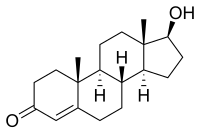
Photo from wikipedia
Androgen deprivation therapy (ADT) decreases muscle mass, force, and physical activity levels but it is unclear if disuse atrophy and testosterone suppression are additive. Additionally, conflicting reports exist on load-mediated… Click to show full abstract
Androgen deprivation therapy (ADT) decreases muscle mass, force, and physical activity levels but it is unclear if disuse atrophy and testosterone suppression are additive. Additionally, conflicting reports exist on load-mediated hypertrophy during ADT and if protein supplementation offsets these deficits. This study sought to determine the role of testosterone suppression and a high protein diet on 1) immobilization-induced atrophy and 2) muscle regrowth during reloading. 8-week old male Fischer 344 rats underwent a sham, castration (ORX) or castration surgery and a high casein diet supplemented with BCAA (ORX+CAS/AA) followed by 10 days of unilateral immobilization (IMM) and 0, 6 or 14 days of reloading. With IMM, body mass gains were ~8% greater than ORX and ORX+CAS/AA that increased to 15% during reloading (both p<0.01). IMM reduced muscle mass by 11-34% (all p<0.01) and extensor digitorum longus and soleus (SOL) force by 21% and 49% (both p<0.01), respectively, with no group differences. During reloading, castration reduced gastrocnemius (~12%) at 6d and SOL mass (~20%) and SOL force recovery (~46%) at 14d relative to Sham (all p<0.05). Specific force reduced castration deficits, indicating muscle atrophy was a key contributor. IMM decreased SOL cross-sectional area by 30.3% (p<0.001) with a trend for reduced regrowth in ORX and ORX+CAS/AA following reloading (p=0.083). Castration did not exacerbate disuse atrophy but may impair recovery of muscle function with no benefit from a CAS/AA diet during reloading. Examining functional outcomes in addition to muscle mass during dietary interventions provide novel insights into muscle regrowth during ADT.
Journal Title: Journal of applied physiology
Year Published: 2020
Link to full text (if available)
Share on Social Media: Sign Up to like & get
recommendations!